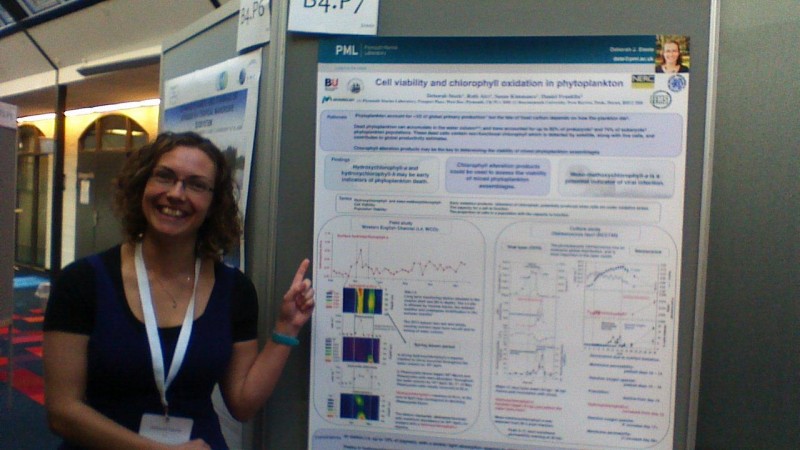Future Oceans
Deborah Steele
Plymouth Marine Laboratory

1st Integrated Marine Biogeochemistry and Ecosystem Research (IMBER) Open Science Conference
This 1st Integrated Marine Biogeochemistry and Ecosystem Research (IMBER) Open Science Conference housed 6 plenary presentations, 24 parallel sessions, 2 poster evenings and 10 workshops with the theme “Research for Marine Sustainability: multiple stressors, drivers, challenges and solutions”. Future Oceans was held in a sunny and beautiful Bergen from the 21rd to the 27th June 2014 and received around 500 participants from 44 countries including 16 developing nations; delegates travelled from across Europe, Scandinavia, USA, Australia, Africa, South America, Canada, Japan, China, India, New Zealand, Taiwan, Israel, Saudi Arabia, republic of Korea and Russia.
The theme of the conference was well reflected in plenary sessions, from Alida Bundy describing the need for a “tiramasu approach” when integrating natural sciences and social sciences; to an up to date global map of Marine Protected Areas and No-take Zones presented by Coleen Moloney and a passionate case for consideration of migratory mega-fauna when planning MPA’s by Claudio Campagna.
The parallel session topics included the ocean carbon cycle, ecological and environmental variability, trait-based modelling of planktonic ecosystems, the dark ocean, mesopelagic functional groups, impact of climate change on marine ecosystems, changing arctic regions, boundary current in the Indian ocean, biogeochemical dynamics, incorporating higher trophic levels in end-to-end models...this diverse list goes on. All sessions ended with open discussions including strategic plans of action for directing research efforts. This gave the sessions a purpose, which was a reflection of the entire conference.
A personal highlight of the conference was Susana Agustí in the Dark Oceans session describing her finding of ubiquitous healthy diatoms from 2000m to 4000 m depth in the Atlantic, Pacific and Indian oceans. This 1st IMBER Open Science Conference was over-subscribed from the outset and was full of propose and drive in the sessions and break-away meetings. It seems to mark an important change for IMBER and afforded the opportunity for outsiders, like me, to join their agenda of understanding the sensitivity of marine biogeochemical cycles and ecosystems to global change, predicting ocean responses, and the effects on the Earth System and human society.
Profile
Deborah Steele is a marine microbial ecologist, using experimental methods and in-situ measurements to investigate the survival mechanisms and death processes of microalgae and how the functionality of the cells alters during these processes. Current research is focused on indicators of microalgal physiological state, using stress induced alteration products of chlorophyll, molecular probes and fluorescence measurements. Deborah is currently finishing her PhD at Plymouth Marine Laboratory. She completed an MSc by dissertation from Essex University in 2010 and prior to that graduated from the University of St Andrews with a BSc (Hons) in Ecology.
Latest News
Royal Society Publishing Photography Competition 2025
Please see a message from the Royal Society below:
We are delighted to announce that the 2025 Competition is now open for entries until 15 August for a chance to win £1000! The competition celebrates the power of photography in conveying the wonder of science happening all around us and photographs can be submitted in the categories of: Astronomy, Behaviour, Earth Science and Climatology, Ecology and Environmental Science, and Microimaging.
The competition is free to enter and open to anyone studying or working in science at graduate level or above. Category winners will receive a one-year membership to the Royal Photographic Society and the overall winner will receive a grand prize of £1,000. Find out more: https://bit.ly/RSPphotocomp
October 2025 MEDIN Workshop: Marine Data Management, Governance and the MEDIN toolset
The Marine Environmental Data and Information Network (MEDIN) are pleased to announce that registration is now open for the next occurrence of our popular free online training workshop: ‘Marine Data Management, Governance and the MEDIN toolset’ on the 13th – 17th October 2025 on OceanTeacher Global Academy.
Marine Data Management, Governance and the MEDIN toolset
The Marine Environmental Data and Information Network (MEDIN) and OceanWise are delighted to invite you to attend our popular free online training workshop: ‘Marine Data Management, Governance and the MEDIN toolset’ on the 19th – 23rd of May 2025.
